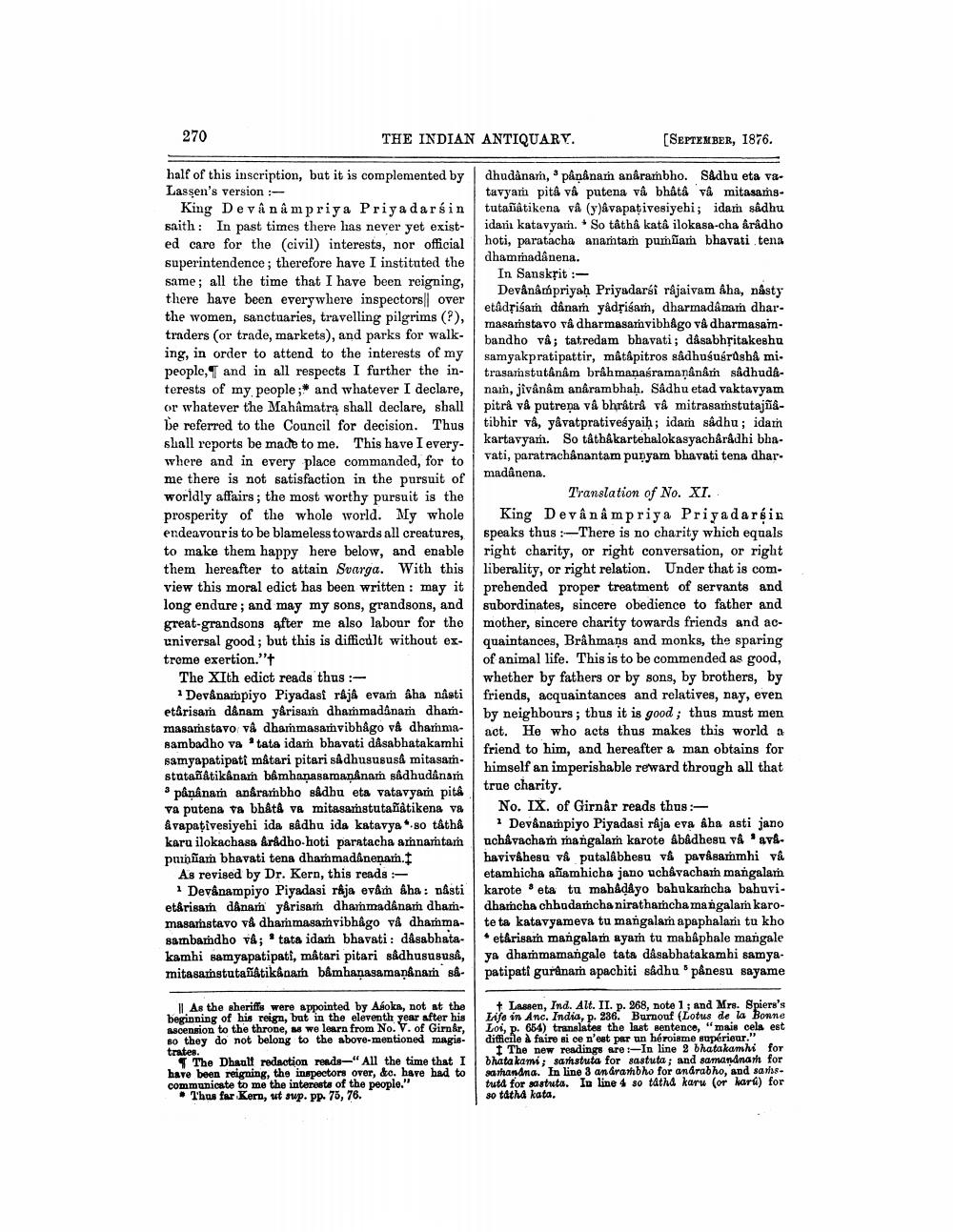________________
270
THE INDIAN ANTIQUARY.
[SEPTEMBER, 1876.
half of this inscription, but it is complemented by Lassen's version :
King Devâ nå mpriya Priyadarsin saith : In past times there has never yet existed care for the (civil) interests, nor official superintendence; therefore have I instituted the same; all the time that I have been reigning, there have been everywhere inspectors|| over the women, sanctuaries, travelling pilgrims (?), traders (or trade, markets), and parks for walking, in order to attend to the interests of my people, and in all respects I further the interests of my people;* and whatever I declare, or whatever the Mahamatra shall declare, shall be referred to the Council for decision. Thus shall reports be made to me. This have I everywhere and in every place commanded, for to me there is not satisfaction in the pursuit of worldly affairs; the most worthy pursuit is the prosperity of the whole world. My whole endeavouris to be blameless towards all creatures, to make them happy here below, and enable them hereafter to attain Svarga. With this view this moral edict has been written : may it long endure; and may my sons, grandsons, and great-grandsons after me also labour for the universal good; but this is difficult without extreme exertion."'+
The XIth edict reads thus:
Devånampiyo Piyadasi raja evam áha násti etårisam danam yarisan dhammadanam dhanmasamstavo vA dharmasamvibhago vê dharmasambadho va tata idam bhavati dasabhatakamhi samyapatipatt matari pitari sådhususus& mitasam. statañatikanan bâmhanasamanAnam sadhudanam
pânânam anârarbho sådhu eta vatavyan pita va putena va bhAtA va mitasamstutafitikena va & vapativesiyehi ida Bâdhu ida katavya *so táth karu ilokachasa Aradho-hoti paratacha amnamtam puntam bhavati tena dharmadinenam. I
As revised by Dr. Kern, this reads :
1 Devanampiyo Piyadasi raja evam Aha: nästi etårisan dAnam yârisar dhammadanam dhammasamstavo va dhammasamvibhago va dhamma sambamdho vâ; tata idam bhavati: dâsabhata kamhi samyapatipati, mâtari pitari sådhusususa, mitasamstutañatikanam bâmhanasamangnam se
dhudånam, pânânar anârambho. Sadhu eta vatavyam pitâ va putena vâbhâtå vå mitasamstutasâtikena va (y)âvapativesiyehi; idam sadhu idari katavyam. * So tâthâ katâ ilokasa-cha &rådho hoti, paratacha anamtam pumữam bhavati tena dhammadanena.
In Sansksit :
Devânâmpriyah Priyadarsi rajaivam kha, nasty etádrisam dånam yådrisam, dharmadánar dharmasamstavo va dharmasamvibhago va dharmasambandho vâ; tatredam bhavati; dasabhritakeshu samyakpratipattir, mâtâpitros sådhususrdshå mitrasarstutânâm brâhmanaśramananám sådhudfnain, jivånam anarambhah. Sadhu etad vaktavyam pitrå vå putreņa va bhràtrå vê mitrasamstutajñatibhir vâ, yâvatprativesyaih; idam sådhu ; idarn kartavyan. So tâthákartehalokasyachårådhi bhavati, paratrachânantam punyam bhavati tena dharmadânena.
Translation of No. XI. King Devânå mpriya Priyadarsin speaks thus :-There is no charity which equals right charity, or right conversation, or right liberality, or right relation. Under that is comprehended proper treatment of servants and subordinates, sincere obedience to father and mother, sincere charity towards friends and acquaintances, Brâhmans and monks, the sparing of animal life. This is to be commended as good, whether by fathers or by sons, by brothers, by friends, acquaintances and relatives, nay, even by neighbours; thus it is good ; thus must men act. He who acts thus makes this world a friend to him, and hereafter a man obtains for himself an imperishable reward through all that true charity. No. IX. of Girnår reads thus :
Devânampiyo Piyadasi raja eva aha asti jano uchávachar mangalam karote Abadhegu va avhavivahesa vi putalábhesu vâ pavasammhi va etamhicha añamhicha jano uchvacham mangalam karote eta tu mahadâyo bahukarncha bahuvi. dharcha chhodamcha niratharchamangalar karote ta katavyameva tu mangalam apaphalari tu kho
etárisan mangalam ayam tu mahậphale mangale ya dharmamangale tata dasabhatakambi samyapatipati guranam apacbiti sadhu pânesu sayame
| As the sheriffe were appointed by Asoka, not at the beginning of his reign, but in the eleventh year after his ascension to the throne, as we learn from No. v. of Girner, so they do not belong to the above-mentioned magistrates.
The Dhault redaction reads—"All the time that I have been reigning, the inspectors over, &c. have had to communicate to me the interests of the people."
• Thus far Kero, ut sup. pp. 75, 76.
+ Lassen, Ind. Alt. II. p. 268, note 1, and Mrs. Spiers's life in Anc. India, p. 236. Burnouf (Lotus de la Bonne Loi, p. 654) translates the last sentence, “mais cela est difficile à faire si ce n'est par un héroisme supérieur."
I The new readings are :-In line 2 bhatakamni for bhata kami; samstuta for sastuta; and samandnar for sarhandna. In line 3 an arambho for andrabho, and sale tuta for sastruta. In line 4 so tatha karu (or hard) for so tátha kata.




